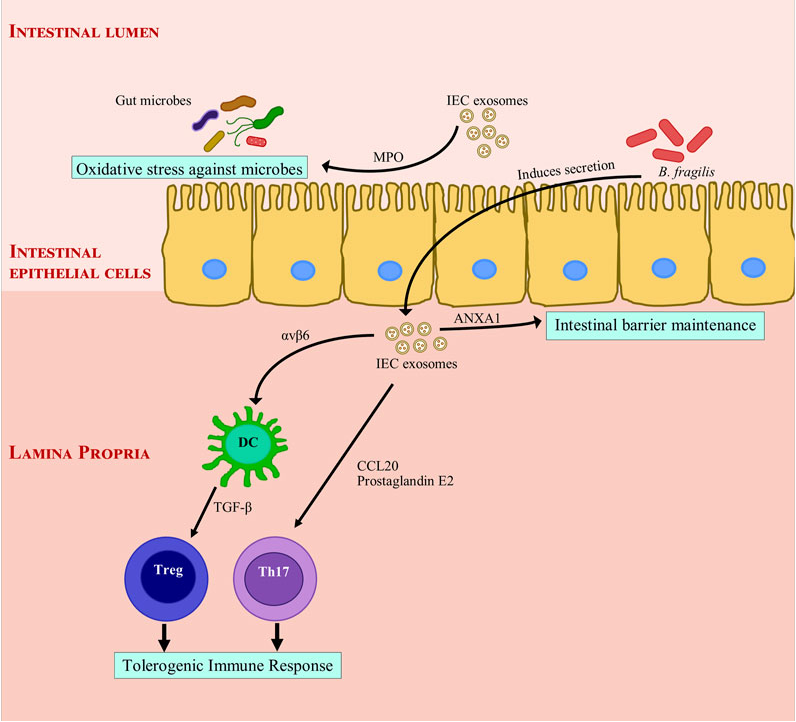Intestinal Tissue Exosome Research and Application
Intestinal Tissue Exosome Research and Application focuses on the systematic investigation of exosomes derived from intestinal tissues and their molecular cargo, including miRNAs, proteins, and lipids. These nanoscale vesicles are secreted by various cell types such as intestinal epithelial cells and play critical roles in maintaining intestinal barrier integrity, responding to microbial stimuli, regulating immune homeostasis, and facilitating inter-organ communication.
Recent studies have demonstrated that intestinal exosomes not only reflect the local physiological and pathological states of gut tissue but also mediate systemic signaling involved in metabolic coordination across organs. As illustrated by Ayyar et al. (Front. Pharmacol. 2021), epithelial cell-derived exosomes contribute significantly to immune balance, mucosal barrier repair, and host–microbiota interactions, providing a valuable model for studying intestinal homeostasis.

Ayyar, K. K. et al. Front. Pharmacol. 2021.
Figure 1. IEC-Derived Exosomes Mediate Intestinal Immune and Barrier Regulation
Leveraging state-of-the-art exosome isolation technologies and multi-omics analysis platforms, MtoZ Biolabs offers high-quality, customized solutions for Intestinal Tissue Exosome Research and Application that enable both mechanistic discovery and translational advancement.
Services at MtoZ Biolabs
MtoZ Biolabs provides standardized yet flexible service modules to support a wide range of research needs within the scope of Intestinal Tissue Exosome Research and Application, including but not limited to:
· Optimized extraction and purification of intestinal exosomes from mouse, rat, primate, and human tissues
· Comprehensive exosome characterization using TEM, NTA, and Western blot
· High-throughput RNA profiling of exosomal miRNA, lncRNA, and circRNA
· Proteomics, lipidomics, and metabolomics to decode functional molecular signatures
· Functional validation assays, including immune modulation, barrier repair, and microbiota interaction models
· In vivo tracking and biodistribution studies to elucidate systemic effects
All services are customizable to align with your experimental goals, whether focused on basic research, disease modeling, or translational medicine.
Why Choose MtoZ Biolabs?
Our expertise in Intestinal Tissue Exosome Research and Application is built on a foundation of robust protocols, integrated technologies, and translational insights:
✔ Tissue-optimized extraction workflows: Tailored enzymatic digestion and purification strategies ensure maximal preservation of exosome integrity and biological activity from complex intestinal tissues
✔ Advanced multi-omics platforms: Orbitrap-based proteomics and Illumina sequencing support deep profiling of exosomal RNA, proteins, and lipids
✔ Cross-disciplinary data integration: Capable of combining exosomal data with microbiome, transcriptomic, and immunomic datasets for a systems-level understanding of gut homeostasis
✔ Validated experimental models: Experience with IBD, colorectal cancer, gut development, and intestinal ischemia-reperfusion models for clinically relevant insight
✔ From discovery to delivery: Services are designed to support both foundational research and applications in engineered exosome development and drug delivery system design
✔ One-Time-Charge: Our pricing is transparent, no hidden fees or additional costs.
Applications
The Intestinal Tissue Exosome Research and Application platform supports a wide range of scientific inquiries, including:
1. Intestinal barrier biology: Investigating how exosomes mediate crosstalk between epithelial and immune cells
2. Inflammatory bowel disease mechanisms: Studying the role of exosomes in immune regulation and microbiota modulation
3. Tumor microenvironment exploration: Analyzing how colorectal tumor-derived exosomes contribute to immune evasion and angiogenesis
4. Gut-organ axis communication: Tracing exosome-mediated signaling along the gut-brain and gut-liver axes
5. Metabolic and nutritional regulation: Elucidating how exosomes respond to dietary inputs and coordinate systemic metabolism
FAQ
Q1: How do intestinal tissue-derived exosomes differ from those in stool or blood?
Intestinal tissue exosomes originate directly from the mucosal microenvironment and more accurately represent localized molecular communication. They are especially valuable for studying barrier function, immune regulation, and gut–organ axis pathways. In contrast, stool or blood exosomes are more heterogeneous and typically used for systemic biomarker discovery. MtoZ Biolabs offers tailored protocols for both applications.
Q2: How is contamination from cell lysis avoided during tissue processing?
We employ a gentle enzymatic digestion method combined with mechanical separation and low-speed centrifugation to remove debris and intact cells. These steps are carefully optimized to preserve native exosomes while minimizing non-exosomal contaminants.
Q3: Can intestinal exosome data be integrated with microbiome or immune system datasets?
Absolutely. Our team has extensive experience in cross-platform bioinformatics. We offer integrated analysis combining exosomal transcriptomics and proteomics with 16S rRNA sequencing, immune repertoire profiling, and metabolomics to uncover gut–host interaction networks.
Whether you are studying intestinal barrier function, microbiota–host interactions, or exploring gut-organ signaling, Intestinal Tissue Exosome Research and Application offers a powerful window into the dynamic biology of the digestive system.
MtoZ Biolabs is committed to providing reliable, high-resolution, and scalable services tailored to your project needs. Contact us today to accelerate your intestinal exosome research and uncover new translational opportunities.
How to order?







